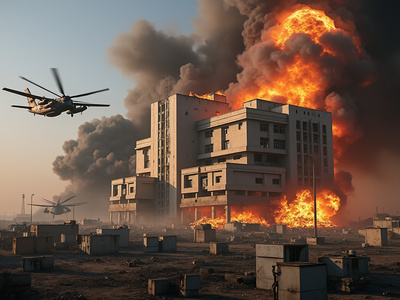
Israel Expands Military Operations in Gaza Amid Hostage Crisis
Israeli forces aim to exert pressure on Hamas for the release of hostages as airstrikes continue in Gaza.
Israeli Prime Minister Benjamin Netanyahu announced on April 2, 2025, that the military is taking decisive steps to apply pressure on Hamas to release hostages held in the Gaza Strip.
Netanyahu described the operation as ‘dissecting’ the territory while Israeli forces continue to seize areas within the region.
According to the Israeli military, recent operations have resulted in significant strikes targeting Hamas infrastructure, including a recent airstrike that struck a United Nations building housing a medical clinic in Jabalia refugee camp, resulting in the deaths of at least 19 individuals, including nine children.
The Israeli army stated that the strike aimed at Hamas militants located within a command and control center.
The Palestinian foreign ministry condemned the attack on the UN facility, referring to it as a ‘massacre’ and calling for international pressure to halt Israel's military escalation.
The United Nations Relief and Works Agency (UNRWA), which oversees humanitarian activities for Palestinian refugees, previously faced attacks on its facilities in Gaza, where many displaced individuals have sought refuge.
In statements regarding the military strategy, Defense Minister Israel Katz detailed plans to expand Israel's military presence in Gaza to target and eliminate terrorist elements.
The army's operations have reportedly included the control of specific strategic locations, notably the ‘Morag Axis’, which is a region running between the southern towns of Khan Yunis and Rafah.
The ongoing military conflict in Gaza has dramatically escalated, resuming intense bombardment on March 18, 2025, after a two-month ceasefire.
Since the resumption of military operations, the health ministry in Gaza reported at least 1,066 casualties, bringing the total death toll to approximately 50,423 following the intensified fighting since Hamas's initial attack on Israel in October 2023, which resulted in over 1,200 Israeli fatalities.
In addition to military maneuvers, humanitarian conditions in Gaza have deteriorated significantly, with food shortages becoming critical.
Local residents reported widespread bakery closures due to a lack of flour and sugar, with supplies cut off since early March.
In diplomatic efforts, Egypt, Qatar, and the United States are reportedly seeking to mediate a new ceasefire agreement and facilitate the release of Israeli hostages.
Negotiations are ongoing, with Hamas indicating a potential willingness to cease hostilities, although it has described disarmament demands as a non-negotiable issue.
While Netanyahu's administration has offered to permit Hamas leaders to leave Gaza under the condition of disarmament, Hamas's leadership remains firm on its stance regarding weaponry.
In related developments, Israel's far-right National Security Minister Itamar Ben Gvir visited the contentious Al-Aqsa Mosque compound, an act that has drawn criticism from various stakeholders, including Jordan, which traditionally serves as custodian of the site.
This visit has heightened tensions, with concerns regarding potential changes to access and prayer rights in the sensitive area.
As the conflict continues to escalate, the humanitarian impact on civilians in Gaza remains a pivotal concern in the evolving situation.
Netanyahu described the operation as ‘dissecting’ the territory while Israeli forces continue to seize areas within the region.
According to the Israeli military, recent operations have resulted in significant strikes targeting Hamas infrastructure, including a recent airstrike that struck a United Nations building housing a medical clinic in Jabalia refugee camp, resulting in the deaths of at least 19 individuals, including nine children.
The Israeli army stated that the strike aimed at Hamas militants located within a command and control center.
The Palestinian foreign ministry condemned the attack on the UN facility, referring to it as a ‘massacre’ and calling for international pressure to halt Israel's military escalation.
The United Nations Relief and Works Agency (UNRWA), which oversees humanitarian activities for Palestinian refugees, previously faced attacks on its facilities in Gaza, where many displaced individuals have sought refuge.
In statements regarding the military strategy, Defense Minister Israel Katz detailed plans to expand Israel's military presence in Gaza to target and eliminate terrorist elements.
The army's operations have reportedly included the control of specific strategic locations, notably the ‘Morag Axis’, which is a region running between the southern towns of Khan Yunis and Rafah.
The ongoing military conflict in Gaza has dramatically escalated, resuming intense bombardment on March 18, 2025, after a two-month ceasefire.
Since the resumption of military operations, the health ministry in Gaza reported at least 1,066 casualties, bringing the total death toll to approximately 50,423 following the intensified fighting since Hamas's initial attack on Israel in October 2023, which resulted in over 1,200 Israeli fatalities.
In addition to military maneuvers, humanitarian conditions in Gaza have deteriorated significantly, with food shortages becoming critical.
Local residents reported widespread bakery closures due to a lack of flour and sugar, with supplies cut off since early March.
In diplomatic efforts, Egypt, Qatar, and the United States are reportedly seeking to mediate a new ceasefire agreement and facilitate the release of Israeli hostages.
Negotiations are ongoing, with Hamas indicating a potential willingness to cease hostilities, although it has described disarmament demands as a non-negotiable issue.
While Netanyahu's administration has offered to permit Hamas leaders to leave Gaza under the condition of disarmament, Hamas's leadership remains firm on its stance regarding weaponry.
In related developments, Israel's far-right National Security Minister Itamar Ben Gvir visited the contentious Al-Aqsa Mosque compound, an act that has drawn criticism from various stakeholders, including Jordan, which traditionally serves as custodian of the site.
This visit has heightened tensions, with concerns regarding potential changes to access and prayer rights in the sensitive area.
As the conflict continues to escalate, the humanitarian impact on civilians in Gaza remains a pivotal concern in the evolving situation.








